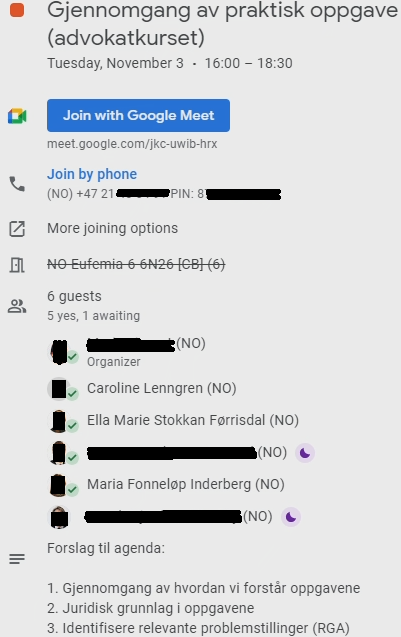Trainee lawyers in PwC Norway’s law arm cheated openly on an official exam required to be licensed as attorneys. Three of those cheating are trainee lawyers Maria Fonneløp Inderberg (→), Caroline Louise Lenngren (→) and Ella Førrisdal (→).
Caroline Lenngren, Maria Inderberg and Ella Førrisdal at PwC were all notified and asked for comment, but declined to respond.

Criteria to practice law are set according to the law
To receive a law license (‘Advokat’) and be admitted to practice law as an attorney in Norway, the law requires a structured course followed by an exam. This requirement is set in the Regulation to the Law of Courts:
§ 8-2 Mandatory lawyer course
In the application for a law license, the applicant must prove that they have completed a course covering topics of particular importance for legal practice. (The lawyer course)
Regulation to the Law of Courts, chapter 8, translation
To pass the course, candidates are required to pass a written home exam, answering a set of legal and ethical questions in essay form.
Individual exams with no cooperation allowed
As typical for home exams, candidates are clearly instructed verbally and in writing that the exams are to be written individually. This also follows from the mailing with the assignments attached:
The home exam shall be an independent and individual piece of work, and be solved on your own. The exam shall not be solved in cooperation with other candidates.
Mailing with assignments attached, translated
Solving the exam as a group would give a significant advantage to lawyers at larger firms, compared to smaller with only a single candidate.
PwC staff posted cheating in open calendars
The PwC trainee lawyers organized two meetings to work on the exam questions as a group, and placed these visible in open calendars side-by-side with client meetings and other activities. A specific point on the agenda (point 3 above) was cheating on the ethics part of the exam, the Code of Conduct for attorneys (‘Regler for God Advokatskikk’, RGA).
A screenshot of the first meeting is posted above. It was documented “live” that the meetings were not just invited to, but also held.
Cheating with the knowledge and permit of PwC lawyers?
The whistleblower later commented:
It’s overwhelmingly unlikely that none of the line managers have heard the open talk about this, or seen a single one of a total of 12 calendar entries (6 trainee lawyers x 2 calendar entries) where cheating would be immediately visible from the title alone – or knew what 17,5 hours (5 trainee lawyers x 3.5 hours) were used for.
Partner Steinar Hareide who heads the Oslo office “Deals Tax” group was asked for comment, but declined.
Right to respond, and option to avoid identification
The named trainee lawyers were given opportunity to comment, but declined. They were also informed that identification would not be very relevant if the law firm had taken any substantial disciplinary action in response to the cheating.
This was also not responded to. A company culture where cheating was normalized would make it improbable that open exam cheating serving the benefit of PwC was reacted to in any substantial manner.
By: Michael Anderson, CFA